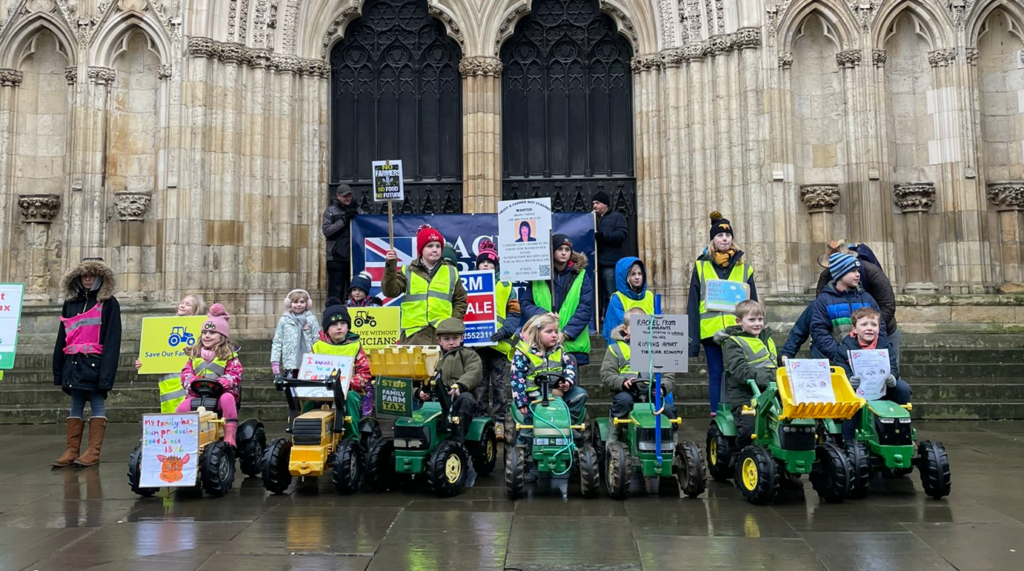I had already written this into based on the IHT announcement and the subsequent farming protests and events organised around the country. But having listened to the brilliant Tom Martin talking on stage at the BASE conference I gave it a little update – as his ideas on communication are spot on and really show us to how to connect more with consumers (our ultimate customers).
But protests don’t necessarily endear you to the public – the train drivers strikes being an example of where this damaged their public support. As an someone involved in the organisation of some of the events, you need to consider what the public think of farming overall.
Public Awareness and Support
The widespread protests have undeniably brought significant attention to the challenges faced by the farming community. Media coverage has been extensive, with major outlets highlighting the concerns and struggles of farmers (possible with the exception of the BBC where coverage has not been extensive). I think, based on looking at our socials, this heightened visibility has fostered a sense of empathy among the public, many of whom were previously unaware of the intricacies of agricultural operations and the financial burdens associated with them.
A public poll conducted shortly after the protests indicated substantial support for farmers, with a majority believing that agricultural estates should be exempt from the proposed inheritance tax changes. I think this sentiment stems from a recognition of the essential role farmers play in ensuring food security and maintaining the rural economy. The public’s growing awareness has translated into a broader appreciation for the hard work and dedication inherent in farming. But does this mean they are more likely to buy UK grown products?
Perception of the Inheritance Tax Reforms
I have yet met a farmer who thinks those buying land to avoid IHT think they should not get taxed. So the policy itself isn’t the issue. But the government’s proposal to impose a 20% inheritance tax on farms valued over £1-3 million (depending on your marital status) has been met with universal disdain. Some segments of the public view it as a necessary measure to address fiscal challenges, but a significant portion perceives it as an undue burden on family-run farms. All organisations, NFU, CLA, TFF, Reform Party, Conservative Party and farmers across the country have been vocal in its opposition, generally arguing that the these changes could impact up to 75% of commercial family farms, potentially forcing them to sell land to meet tax obligations. These are not the demographic that the government said they were targeting.
This perspective resonates with many people who value the tradition of family-owned farms and fear that such policies might lead to the corporatisation of agriculture, thereby eroding local communities and traditions. But there seems to be a big urban / rural divide. The public discourse suggests a growing concern that the reforms could inadvertently favour large agribusinesses over smaller, family-run operations.
Beyond the immediate issue of inheritance tax, the protests certainly have shed light on a range of challenges confronting the farming sector. Farmers have expressed feelings of neglect and misunderstanding by urban policymakers, citing issues such as recent weather, fluctuating market prices, and changes from BPS to SFI post-Brexit. Generally, I think these grievances have struck a chord with the public, many of whom are beginning to grasp the multifaceted pressures faced by those in agriculture. We have the likes of Clarkson’s Farm and others for highlighting these issues over the past 3 years. It’s not the first time the public are hearing this.
I do see that the narrative is shifting towards a more inclusive understanding of the agricultural sector’s pivotal role in the nation’s well-being.
The Path Forward
In this instance, the collective voice of the farming community, amplified by public support, has initiated a critical dialogue about the future of agriculture in the UK. A unified farming community has spoken and the public (and government) have heard 1000s of voices as opposed to just the few.
Tom Martin said a very similar thing on stage. If lots of us take on the responsibility to talk to the public about what we are doing, our collective voice grows and I’ve seen the impact of that over the past 3 months.
Think about who you communicate with, be it online, in parish magazines, in the pub, in local schools and do a little bit more. Because if we all do a bit more the public will know a lot more about farming.


